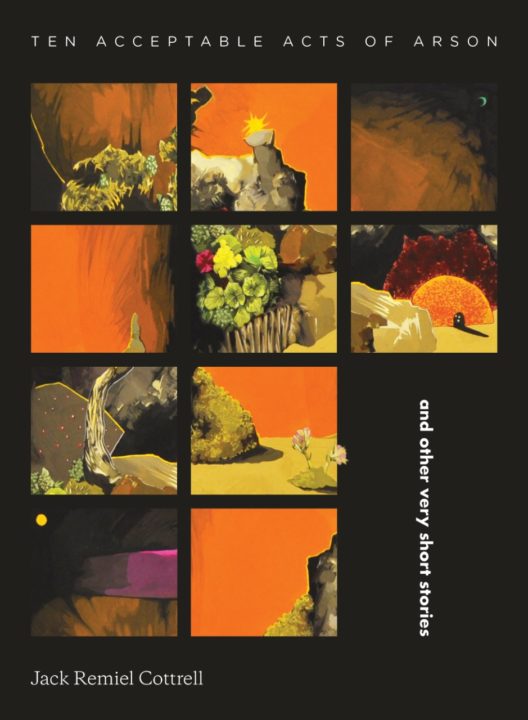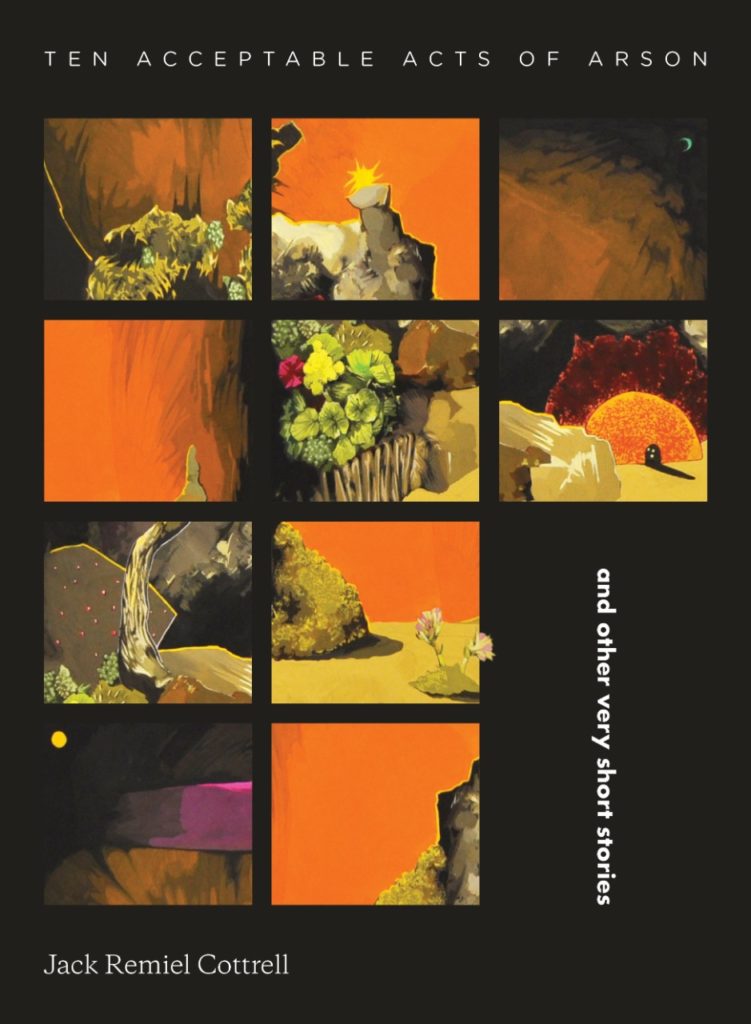Ten acceptable acts of arson: and other very short stories

Ten acceptable acts of arson: and other very short stories by Jack Remiel Cottrell. Christchurch: University of Canterbury Press (2021). RRP: $29.99. Pb, 136 pp. ISBN: 9781988503257. Reviewed by Tim Jones.
Let’s get the main point out of the way first: Jack Remiel Cottrell (Ngāti Rangi) is a very good writer, and this book is both very satisfying in itself and an excellent showcase of his skills.
Ten Acceptable Acts of Arson is a collection of flash fictions, which are generally defined as stories of 1 to 500 words: some definitions are more severe. Most of these stories fit on a single page.
The collection is divided into sections named after the days of the week – and each day starts with a story titled “A week in the life”. Appropriately, the sports stories are grouped on Saturday, while on Sunday come the stories about religion – about which Jack Remiel Cottrell writes very well:
Find the God of HFCS, phenylalanine, and Two Dollar Shop knockoffs. Have faith in something with scandalously low expectations. Worship a God who can meet you halfway to holy, might accept prayers in emojis, will speak to you in a language that you can understand. (“For the convenience of other sinners”, p. 115)
Flash fiction has a strong recent history in Aotearoa. In the late 1990s, Graeme Lay and Stephen Stratford edited a series of anthologies of 500-word short stories that sold well & were well received. Since 2012, Flash Frontier magazine – which recently held its 10th anniversary celebrations – and the associated National Flash Fiction Day competitions have given a regular home to New Zealand writers of flash fiction and strengthened links with the international flash fiction community.
So this book arrives at an auspicious moment – and it lives up to that moment. The collection allows Jack Remiel Cottrell to play with form, with genre, and with your feelings. It’s a delight to see this kind of slipstream fiction – fiction that slips between and among genres, including but not limited to absurdism, horror, literary fiction, science fiction and sports fiction – now so securely placed with the mainstream of New Zealand literature.
In fiction, the trick is to know what to leave out. This is greatly magnified when writing flash fiction, and the author has done an outstanding job in quickly establishing setting, tone and character. Some of the stories here are Borges-like in the way that strong emotion shines through strictly defined form, such as the outstanding “Reasons why I called in sick rather than go to the mihi whakatau for new employees last Friday”, a story in the form of a numbered list that’s full of devastating entries like this:
3. In my first year of uni the RA asked if anyone on our floor was Māori. When I said yes, a guy yelled ‘What tribe are you from, Ngāti Ginger Ninjas?’ (“Reasons why I called in sick rather than go to the mihi whakatau for new employees last Friday”, p. 16)
Several of my favourite pieces in this collection take the form of lists: another is “New Zealand gothic” (pp. 104-5), which is as handy a short guide to modern Aotearoa as you could wish for:
The motorways are under construction. They are always under construction. They stretch to unimagined planes of torment and ecstasy. They will allow you to reach those destinations seven minutes faster. (“New Zealand gothic”, p. 105)
The list poem, the literary twin of such stories, lurks a genre’s width away.
In a collection of such breadth, not every story has the same impact. But if one doesn’t grab you, another is waiting at the turn of a page to knock the wind from your lungs. I found it hard to identify with the prop forward stubbornly charging forward on p. 99, being more of a willowy Gore liberal myself, but when I turned the page to the toe-damaged fast bowler on p. 100, the wince of recognition was all too real:
Just one game left and he has to admit — it is dead. His overs today have jammed the nail half a centimetre back into his toe and the Phyz took one look and said it had to come out. Then he offered Mickey the tweezers to do it himself. (“Consequences of pace bowling number 322: Severe trust issues”, p. 100)
So I say: get this book, read it, and watch what Jack Remiel Cottrell does next. It’s going to be worth your while.
